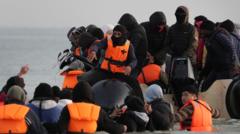Are Gang Leaders the First Targets of New Small Boat Sanctions?

Understanding the New Sanctions Against People-Smuggling Networks in the UK
In a significant move aimed at curbing the ongoing crisis of migrants crossing the English Channel, the UK government has introduced new sanctions targeting individuals and organizations involved in people-smuggling. These measures are seen as a critical part of a broader strategy to combat illegal immigration, particularly from small boats. The recent announcement has generated considerable discourse among policymakers, experts, and the public regarding its potential effectiveness and ramifications.
The first wave of sanctions has targeted 25 specific individuals and entities, including notorious gang leaders and boat suppliers. This decisive action underscores the UK’s commitment to addressing illegal migration and protecting vulnerable lives. However, experts have raised concerns about the effectiveness of these measures, suggesting that the nature of smuggling networks may limit the impact of such targeted actions.
The Targets of the New Sanctions
The initial sanctions list features a range of individuals, including Bledar Lala, an Albanian national linked to smuggling operations from Belgium, and Alen Basil, a former police translator accused of running a trafficking network from Serbia. These individuals are now barred from entering the UK, and their assets within the country have been frozen.
Among the sanctioned entities is Weihai Yamar Outdoors Product Co, a Chinese firm accused of manufacturing inflatable boats that are reportedly used in people-smuggling operations. The freezing of assets allows UK authorities to cut financial ties with these individuals and companies, aiming to disrupt their operations significantly.
Government Statements and Public Response
Foreign Secretary David Lammy hailed the sanctions as a "landmark moment" in the fight against people-smuggling. He emphasized the UK’s dedication to dismantling these criminal networks, stating, “We are taking the fight to the people-smugglers who enable irregular migration, targeting them wherever they are in the world.” His remarks reflect a broader governmental strategy that seeks to hold accountable those who exploit vulnerable individuals for profit.
However, reactions from experts, such as Dr. Madeleine Sumption from Oxford University's Migration Observatory, indicate skepticism regarding the potential effectiveness of these sanctions. She pointed out that the people-smuggling industry is expansive, and targeting individuals may only yield marginal impacts. According to her, the actual effectiveness of these sanctions will depend significantly on international cooperation, particularly with countries where smugglers operate.
Legislative Measures and Broader Strategy
The sanctions are part of a series of measures introduced by the Labour government since taking office in July 2022, aimed at tackling illegal immigration. These measures include the introduction of a new criminal offense specifically targeting those who endanger lives at sea. Additionally, legislation currently progressing through Parliament proposes using counter-terrorism powers to combat people-smuggling activities. This legislation could lead to travel bans, social media restrictions, and phone monitoring for suspects.
Despite these efforts, the statistics on small boat crossings paint a sobering picture. As of early 2025, over 21,000 individuals have made the perilous journey across the Channel, representing a dramatic 56% increase compared to the same period in 2024. This surge raises questions about the effectiveness of current policies and the feasibility of significantly reducing illegal crossings.
The Nature of People-Smuggling Networks
To fully understand the context of these sanctions, it’s essential to delve into the complex structure of people-smuggling networks. These networks often involve multiple layers of criminal activity, including recruitment, transportation, and financial transactions. Individuals engaged in this trade may operate independently or as part of larger organized crime groups.
Furthermore, smuggling networks are highly adaptable. When one member is apprehended or sanctioned, others often step in to fill the void. This resilience makes it challenging for authorities to dismantle these operations entirely. Experts argue that a more comprehensive approach, involving international collaboration and addressing the root causes of migration, is necessary to create lasting change.
Challenges in Implementation and Enforcement
The implementation of sanctions and enforcement of new laws also face numerous challenges. For instance, the effectiveness of asset freezes relies heavily on robust intelligence and the ability to track and identify assets belonging to sanctioned individuals. This requires significant resources and international cooperation, which may not always be forthcoming.
Moreover, the legal and logistical complexities surrounding the enforcement of travel bans and financial sanctions can hinder progress. Countries may have differing legal frameworks and levels of commitment to combatting human trafficking, complicating cooperation efforts.
The Bigger Picture: Addressing Root Causes
While sanctions and targeted measures are essential components of the strategy to combat people-smuggling, experts emphasize the importance of addressing the underlying issues that drive individuals to undertake dangerous journeys. Factors such as political instability, economic hardship, and persecution in home countries play a significant role in migration trends.
To effectively reduce the number of individuals attempting to cross the Channel in small boats, comprehensive solutions that involve international development, humanitarian assistance, and diplomatic engagement are necessary. This multifaceted approach can help alleviate the pressures that lead to illegal migration, ultimately reducing the demand for smuggling services.
Conclusion
The recent sanctions against people-smuggling networks represent a crucial step in the UK’s ongoing battle against illegal migration. However, their effectiveness remains uncertain, given the complex nature of the smuggling industry and the challenges associated with enforcement and international cooperation. As the number of crossings continues to rise, policymakers must consider a broader strategy that addresses the root causes of migration while also implementing targeted measures against those who profit from human suffering.
In light of the ongoing challenges, how can nations balance the enforcement of immigration policies with humanitarian considerations? What further steps should be taken to effectively combat people-smuggling and protect vulnerable populations?
FAQs
What are the new sanctions against people-smuggling networks in the UK?
The UK government has introduced sanctions against 25 individuals and entities linked to people-smuggling, including asset freezes and travel bans.
Who are some of the individuals targeted by these sanctions?
Notable targets include Bledar Lala, an Albanian linked to smuggling operations, and Alen Basil, a former police translator accused of running a trafficking network.
How effective are these sanctions likely to be?
Experts suggest that while the sanctions are a step forward, their effectiveness may be limited due to the vast and adaptable nature of people-smuggling networks.
What other measures is the UK government implementing to combat people-smuggling?
The UK government is also introducing new criminal offenses related to endangering lives at sea and plans to use counter-terrorism powers against smugglers.
In a world increasingly challenged by migration issues, how can we foster a dialogue that balances security and compassion? #Migration #PeopleSmuggling #UKSanctions
Published: 2025-07-23 09:08:02 | Category: sport



